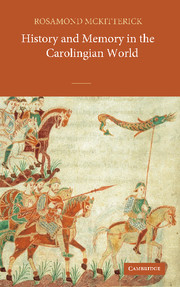Book contents
- Frontmatter
- Contents
- Preface
- Acknowledgements
- List of abbreviations
- 1 Introduction: History and memory in the Carolingian world
- 2 Carolingian history books
- 3 Paul the Deacon's Historia langobardorum and the Franks
- 4 The Carolingians on their past
- 5 Politics and history
- 6 Kingship and the writing of history
- 7 Social memory, commemoration and the book
- 8 History and memory in early medieval Bavaria
- 9 The reading of history at Lorsch and St Amand
- 10 Texts, authority and the history of the church
- 11 Christianity as history
- 12 Conclusion: History and its audiences in the Carolingian world
- Bibliography
- Index of manuscripts
- General index
4 - The Carolingians on their past
Published online by Cambridge University Press: 15 December 2009
- Frontmatter
- Contents
- Preface
- Acknowledgements
- List of abbreviations
- 1 Introduction: History and memory in the Carolingian world
- 2 Carolingian history books
- 3 Paul the Deacon's Historia langobardorum and the Franks
- 4 The Carolingians on their past
- 5 Politics and history
- 6 Kingship and the writing of history
- 7 Social memory, commemoration and the book
- 8 History and memory in early medieval Bavaria
- 9 The reading of history at Lorsch and St Amand
- 10 Texts, authority and the history of the church
- 11 Christianity as history
- 12 Conclusion: History and its audiences in the Carolingian world
- Bibliography
- Index of manuscripts
- General index
Summary
Human beings are in a perpetual dialogue with the past from their vantage point in the present. St Augustine of Hippo (†430) put this most succinctly when he discussed what he thought of as ‘three times’, that is, ‘a present concerning past things; a present concerning present things and a present concerning future things. For these three are in the spirit and I do not see them elsewhere: the present concerning past things is memory; the present concerning present things is perception; the present concerning future things is expectation.’
To record and explain the past, men and women in history have resorted to many means. In calendars, necrologies and martyrologies, for example, past and present time are organised in conjunction with each other, for past time is remembered in terms of the commemoration of anniversaries in the present. Memories may even be heightened and given the impetus to record them in writing by contemporary crises. In our own profession of the writing of history, particular constraints are in evidence. We all construct a past which we try to make as faithful to our evidence as possible. Yet limitations of memory (both our own and that of the authors of our sources) and the chronological framework, quite apart from the nature of the discipline and conventions associated with historiography as a genre, play a crucial role in producing distinctive interpretations of the past of varying degrees of plausibility and conviction.
In constructing an account of the past a writer can either work within the confines of a particular genre or create new conventions of his or her own for the record of memory.
- Type
- Chapter
- Information
- History and Memory in the Carolingian World , pp. 84 - 119Publisher: Cambridge University PressPrint publication year: 2004



